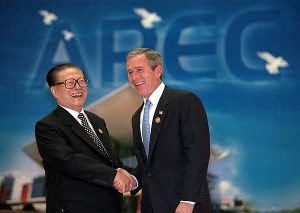It is perhaps fitting that Jiang Zemin died at the height of Xi Jinping-style governance in China. Just a few weeks after the 20th Party Congress made it official that Xi is paramount leader for life and that the factions that might oppose him (including Jiang’s Shanghai Clique) have been dismantled, the Chinese government announced that Jiang, who was general secretary of the Chinese Communist Party (CCP) from 1989 to 2002, died on November 30 at age 96.
Shanghai, where Jiang built his power base and reportedly died, is one of the cities where Chinese citizens have been protesting the Xi government’s zero COVID policy, which includes overzealous lockdowns that imprison people inside residential buildings, sometimes with tragic results.
Jiang’s passing serves us an opportunity to re-evaluate his leadership – and compare it to Xi Jinping’s. In fundamental ways Xi’s approach to foreign affairs is dramatically different from Jiang’s.
To be sure, Jiang was not a liberal, nor was he in every respect the opposite of Xi. Like other PRC leaders, he presided over a state that ruthlessly quashed challenges to the supremacy of the Chinese Communist Party. Jiang’s government implemented the persecution of the Falun Gong society in reaction to the group’s peaceful and silent mass protest outside Zhongnanhai in 1999.
Jiang also maintained Beijing’s threat to use military force to prevent Taiwan from choosing de jure independence from China. The People’s Liberation Army’s military exercises and missile launches in 1995-96, an unsuccessful campaign to intimidate Taiwan from re-electing President Lee Teng-hui, occurred on Jiang’s watch.
Jiang, however, ruled during a relatively conciliatory period in China’s foreign relations. Deng Xiaoping had advised his successors in the top leadership to pursue a non-confrontational foreign policy, saying China should eschew taking the lead in international affairs and should remain calm in the face of offenses by foreigners. Jiang followed this advice so well that he often came under domestic criticism for being too soft toward the United States.
The Deng doctrine underwent an acid test in 1999, when a U.S. aircraft bombed the Chinese embassy in Belgrade in the midst of the Kosovo War. The PRC leadership debated whether the main thrust of China’s foreign policy should change from “peace and development” (centered in maintaining a cooperative relationship with the United States) to “resisting hegemonism” (which would mean confronting and resisting alleged U.S. suppression of China). Ultimately Jiang’s government decided to stay the course.
When Jiang met with U.S. interviewer Mike Wallace, the Chinese leader not only took tough questions, he recited part of Abraham Lincoln’s Gettysburg Address. Off camera, Jiang and Wallace reportedly sang “O Sole Mio” together. This side of Jiang contrasts starkly with Xi, who is extremely guarded in his public behavior, is deeply hostile toward Western “liberalism,” and avoids interaction with foreign journalists. Indeed, Xi’s staff reportedly assaulted a U.S. television news producer when she tried to ask a question prior to the Biden-Xi meeting at the G20 Summit in November.
Jiang assumed the position of CCP general secretary after the government’s shockingly violent suppression of protestors in and near Tiananmen Square. He helped rehabilitate China’s damaged image and standing in the international community. Jiang was in power when the International Olympic Committee chose Beijing as host of the 2008 Olympic Games and when China entered the World Trade Organization.
Xi, on the other hand, started from a high point and has driven China’s prestige into the ground. Xi’s government has isolated China internationally not only through extreme anti-pandemic measures, but also by encouraging aggressive and abrasive behavior by Chinese officials abroad and by conducting statecraft that relies heavily on economic coercion and military intimidation.
Xi signaled that he was casting aside the Deng doctrine. He started by burying precious coral reefs under piles of sand to build military bases in international waters in the South China Sea. This destroyed hopes that Beijing would seek a compromise solution short of claiming the South China Sea within the “nine-dashed line” as China’s territory. Chinese military and quasi-military units also stepped up their aggressive behavior in the region.
During the pandemic, “wolf warrior” diplomacy became the norm. With Xi’s encouragement, instead of fostering good relations with foreign countries, Chinese diplomats scolded and insulted them in order to please their bosses and the Chinese domestic audience. China’s global image declined sharply in the developed world, and Chinese behavior has engendered ill will in the Global South also.
Employing China’s economic power to threaten or punish trading partners over political disputes has become routine under Xi. Beijing simultaneously raised tensions with India, Australia, Japan, Taiwan, and the United States.
Xi has firmly positioned China as a diplomatic supporter of international pariahs: the Kim regime in North Korea and Putin regime in Russia.
Not surprisingly, China’s behavior is pushing other governments into decoupling from China and into greater anti-China cooperation among themselves, from AUKUS and the Quad to planning for Taiwan Strait war contingencies. Xi’s manifest hubris has stimulated economic and technological decoupling that threatens to lower China’s future economic development trajectory.
In recent years some Chinese expressed a nostalgic fondness for Jiang. Comparing Jiang to a toad, once derisive, because an expression of endearment. Many Chinese have come to associate Jiang with an era that is brighter and more hopeful than the literal and figurative lockdown Xi has brought upon China. Many people outside China would agree.
































